With Picture Perfect Portfolios set to celebrate its first birthday in April, I must admit I’m pleased with the diverse range of investment strategies and products that we’ve covered.
We’ve zeroed in on factor focused equities, market neutral, long-short equity, arbitrage and managed futures just to name a few.
However, there is one strategy in particular that we’ve yet to shine the spotlight on: buffer funds.
Also known as defined outcome ETFs.
Today we’re fortunate enough to be joined by Tim Urbanowicz, CFA, Head of Research & Investment Strategy, Innovator ETFs.
We’ll be unpacking everything under the sun related to this particular strategy as we continue our “Strategy Behind The Fund” series.
Without further ado, let’s turn things over to Tim!

Meet Tim Urbanowicz of Innovator ETFs
Ever since I was a kid, I had a fascination with financial markets.
Growing up, we never had a lot of extra money, but when we did, it was always put in the bank with the goal of keeping it safe.
The stock market was viewed as way too risky.
The first time someone explained the time value of money to me, my mind was blown and I was hooked.
Fast forward a few years, I went off to school at Wheaton College in Wheaton, IL.
One of my business classes my junior year, I was assigned to study a local business, and unbeknownst to me, Wheaton, IL was on its way to becoming a powerhouse in the ETF industry.
The business I was assigned to was PowerShares ETFs, which is now the 4th largest ETF franchise in the world under the Invesco umbrella.
As a college student, sitting in front of ETF legends Bruce Bond and John Southard – having them explain to me what the ETF was, all the advantages it had, and how they were disrupting the market – was an incredible experience and one I was so blessed to have.
Ever since then I knew I wanted to work in ETFs.
Right out of school, I spent a few years at JP Morgan, before I was able to land a spot at PowerShares.
At PowerShares, I spent some time in sales, before moving on to help build out the capital markets group, and then serving as the director of fixed income ETFs for Invesco.
As for getting over to Innovator, a very good friend of mine, Trevor Terrell, was and is leading the distribution efforts for the firm.
We had discussed the idea of going over for a while, and at the time I was serving as an investment strategist for Northern Trust.
There finally came a point where it made sense for both of us, and it has been a fun ride ever since to become part of such a fast-growing organization whose products advisors are very drawn to.

Reviewing The Strategy Behind PJAN ETF (U.S. Equity Power Buffer ETF: January Series) with Tim Urbanowicz

About the Author & Disclosure
Picture Perfect Portfolios is the quantitative research arm of Samuel Jeffery, co-founder of the Samuel & Audrey Media Network. With over 15 years of global business experience and two World Travel Awards (Europe’s Leading Marketing Campaign 2017 & 2018), Samuel brings a unique global macro perspective to asset allocation.
Note: This content is strictly for educational purposes and reflects personal opinions, not professional financial advice. All strategies discussed involve risk; please consult a qualified advisor before investing.
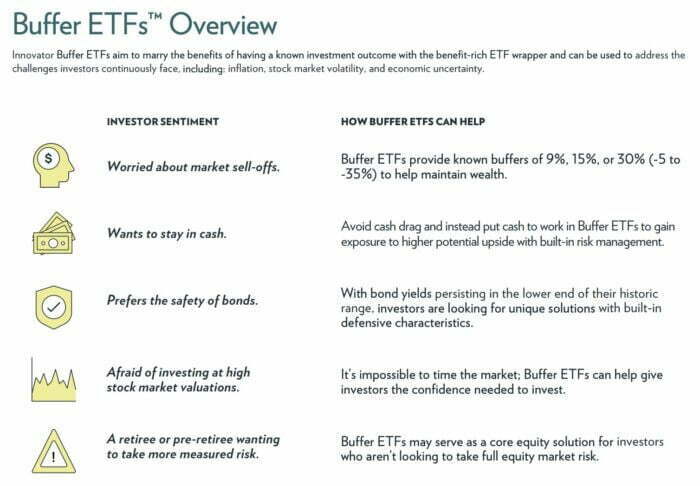
These asset allocation ideas and model portfolios presented herein are purely for entertainment purposes only. This is NOT investment advice. These models are hypothetical and are intended to provide general information about potential ways to organize a portfolio based on theoretical scenarios and assumptions. They do not take into account the investment objectives, financial situation/goals, risk tolerance and/or specific needs of any particular individual.

What’s The Strategy Of Buffer “Defined Outcome” ETFs?
For those who aren’t necessarily familiar with buffer “defined outcome ETFs” style of investing, let’s first define what it is and then explain this strategy in practice by giving some clear examples.
Buffer ETFs are tools that can help investors narrow the range of potential outcomes by providing a defined outcome.
The ETFs offer upside exposure of a reference asset, such as SPY, QQQ, IWM, EFA or EEM, up to a predetermined cap, with a known buffer against losses over the outcome period.
As an example, IJAN, the Innovator Intl Developed Power Buffer ETF offers upside exposure to EFA up to a 22.51% cap and also provides a 15% buffer against losses, over the 12-month outcome period spanning 2023.
Another example would be BALT, the Innovator Defined Wealth Shield ETF.
This strategy offers upside exposure to SPY up to a 2.64% cap, with a 20% buffer against losses over a 3-month outcome period.
Each quarter, BALT simply resets and investors have a new 20% buffer against SPY losses and a new upside cap for the coming 3-month outcome period.
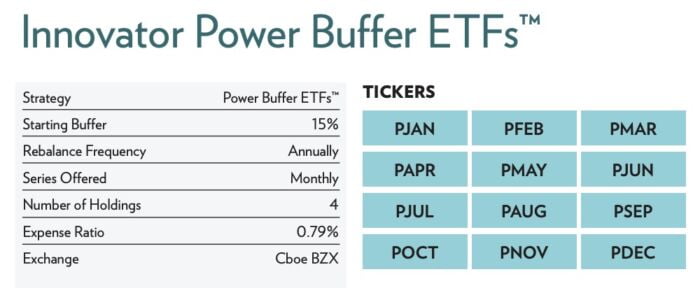

Unique Features Of U.S. Equity Power Buffer ETF (January Series) PJAN ETF
Let’s go over all the unique features your fund offers so investors can better understand it.
What key exposure does it offer?
Is it static or dynamic in nature?
Is it active or passive?
Is it leveraged or not?
Is it a rules-based strategy or does it involve some discretionary inputs?
How about its fee structure?
- PJAN, Innovator US Equity Power Buffer ETF offers upside exposure to SPY, up to a 18.84% cap, with a 15% Buffer against losses over the 12-month outcome period spanning 2023.
- In order to deliver the outcome to investors, the options portfolio is set on the beginning of the outcome period and remains static through the end of the outcome period.
- The ETFs are structured as active and there is no leverage in PJAN or any other fund that Innovator offers for that matter.
- PJAN’s fee is 0.79% and is accrued daily, which is no different than other ETFs in the marketplace.
source: Innovator ETFs on YouTube

What Sets U.S. Equity Power Buffer ETF (January Series) PJAN ETF Apart From Other Alternative Funds?
How does your fund set itself apart from other defensive alternative funds being offered in what is already a crowded marketplace?
What makes it unique?
There is no guesswork like you have with other strategies that might be categorized as ‘alternative’.
PJAN has a defined outcome and we know that if SPY goes up X, we are going to capture Y.
If SPY goes down, we know the level of protection we have.
This is very different than anything else that was in the ETF market and the big reason, in my opinion, that flows, interest and assets in Defined Outcome ETFs are exploding.
Investors hate uncertainty and unfortunately with most alternative strategies, there is always some level of it in terms of how a given strategy will work vs. a backtest.
Advisors and investors are often disenchanted when theory meets actual market realities.
PJAN removes that uncertainty.

When Will PJAN ETF (U.S. Equity Power Buffer ETF: January Series) Perform At Its Best/Worst?
Let’s explore when your fund/strategy has performed at its best and worst historically or theoretically in backtests.
What types of market conditions or other scenarios are most favourable for this particular strategy?
On the other hand, when can investors expect this strategy to potentially struggle?
As I mentioned earlier, there is no guesswork with what Innovator Buffer ETFs deliver, and PJAN is no exception.
We know the upside we will capture, and we know the downside buffer we have in place.
PJAN is going to work the best relative to SPY when the equity market is selling off or when it is appreciating less than the cap.
The strategy will be less advantageous when the equity market rips above the cap. 2022 and 2020 provide a good example of each.
In 2022, SPY sold off over 19%, so investors realized the full 15% buffer, less the expense ratio over the outcome period, for a return of -5%.
In 2020, SPY finished up over 16% and at the time, PJAN had a cap of 8.5%. PJAN was capped out at 8.5%, less the expense ratio, for a total return of 7.7%.
PJAN ETF 2020 Cumulative Return
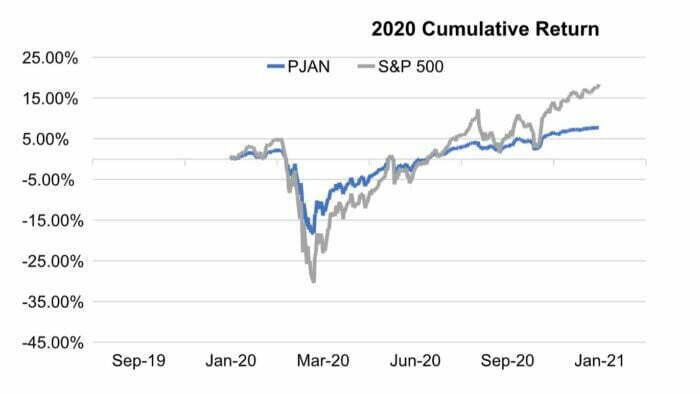
PJAN ETF 2022 Cumulative Return
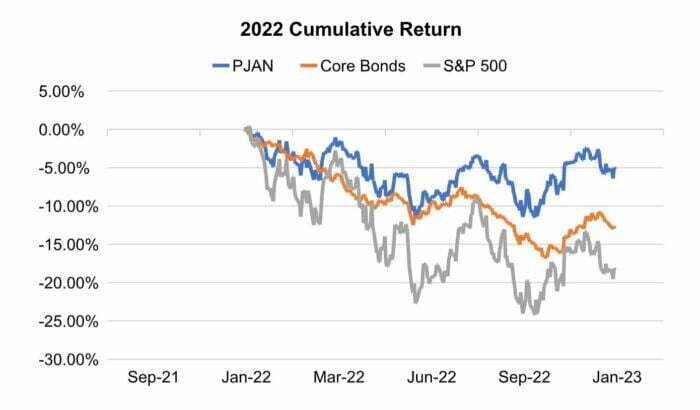

Why Should Investors Consider U.S. Equity Power Buffer ETF (January Series) PJAN ETF?
If we’re assuming that an industry standard portfolio for most investors is one aligned towards low cost beta exposure to global equities and bonds, why should investors consider your fund/strategy?
A few reasons.
One, Defined Outcome ETFs put investors in control of their risk and return profile, and allow them to target the exact exposure they want.
Investors have different needs, goals, and timelines and these strategies can really help them address all three with precision.
They are great tools for advisors helping clients plan, discussing expectations for their investment returns and matching their portfolios with their risk tolerance.
Secondly, with where the markets are right now, we think its very important for investors to look outside of the traditional asset allocation framework for risk management.
Higher inflation and higher interest rates remain the biggest threat to the market and continue to drive both equities and bonds higher and lower together.
Relying on traditional fixed income for risk management was a big mistake in 2022 and the backdrop for 2023 looks very similar.
Defined Outcome ETFs can really come in and add that risk management element investors need.
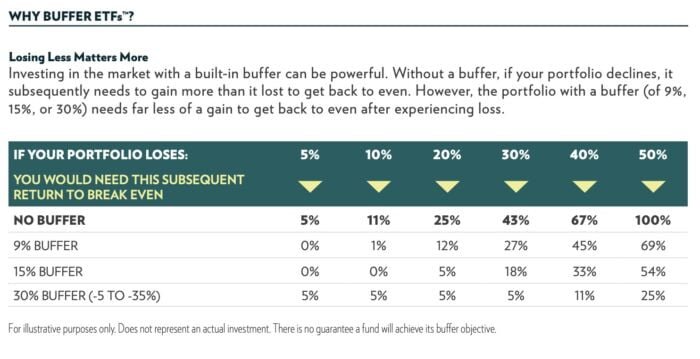

How Does PJAN ETF (U.S. Equity Power Buffer ETF: January Series) Fit Into A Portfolio At Large?
Let’s examine how your fund/strategy integrates into a portfolio at large.
Is it meant to be a total portfolio solution, core holding or satellite diversifier?
What are some best case usage scenarios ranging from high to low conviction allocations?
Our strategies allow investors to dial down their risk as little or as much as they want.
Within research, I also have the opportunity to oversee our portfolio solutions team, which gives us a good view into how the financial advisor and institutional communities are using our Defined Outcome ETFs.
For PJAN, the applications have been wide-ranging.
We see a lot of teams using PJAN as a bond replacement or a bond complement, which has proven very advantageous recently.
Other groups use the fund as a way to complement equity exposure and dial down total portfolio risk.
Others use PJAN as a way to tactically implement their investment views.
These are just a few examples, there are many other applications as well.

The Cons of PJAN ETF: U.S. Equity Power Buffer ETF (January Series)
What’s the biggest point of constructive criticism you’ve received about your fund since it has launched?
The biggest hang up early on was that you don’t get the dividend.
When we construct the portfolio, we use the market’s dividend to finance the buffer.
After last year’s sell off, however, and the 15% buffer that was delivered, I haven’t heard much criticism over missing the 1.6-1.7% dividend.
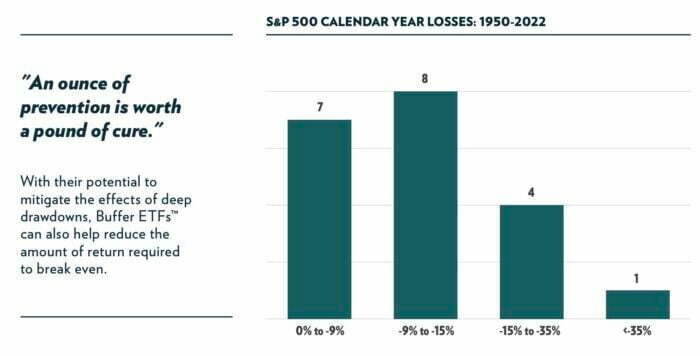

The Pros of PJAN ETF: U.S. Equity Power Buffer ETF (January Series)
On the other hand, what have others praised about your fund?
Consistently delivering the outcome and experience that was expected. Innovator’s Defined Outcome ETF™ lineup has amassed 209 outcome period completions with the ETFs successfully resetting for the coming outcome period, and our first Buffer ETFs – BJUL, PJUL and UJUL are approaching their fifth rebalance.
The ETFs have done what they say they will do in terms of delivering a known buffer and exposure to market upside, and without capital gains distributions.
That track record has attracted more and more attention from investors.

Stay Tuned For Defined Outcome Income Strategies In The Near Future
We’ll finish things off with an open-ended question.
Is there anything that we haven’t covered yet that you’d like to mention about your fund/strategy?
We are really excited about a series of defined outcome income strategies that we should have coming to market in the near future.
These strategies will seek to deliver a known, high level of income, with a built-in barrier against losses over the outcome period.
This is something our client base has been asking for, and we are excited to deliver.

PJAN (Innovator U.S. Equity Power Buffer ETF – January): Strategy, Use-Cases, Caps & Buffers — 12-Question FAQ
What is PJAN and what problem does it solve?
PJAN is a defined outcome “power buffer” ETF tied to the S&P 500 (via SPY options). Over a 12-month outcome period starting each January, it seeks to buffer a preset slice of downside while participating in upside up to a cap, giving investors a narrower, more predictable return band than plain beta.
How does the buffer and cap actually work?
At the start of the January outcome period, PJAN purchases a static, rules-based options package on the S&P 500 that: (1) targets a downside buffer (e.g., ~15% before fees) and (2) sets an upside cap. If the S&P 500 falls within the buffer amount, losses are mitigated; if it rises, gains are participation-capped for that period.
Is PJAN actively managed or leveraged?
The strategy is implemented actively at the reset (options are selected and then held static through the period); no portfolio leverage is used. Between resets, PJAN generally does not “trade around” the structure—outcomes are defined up front and then allowed to play out.
Do investors still receive the S&P 500 dividend?
No. Dividends are effectively used to help finance the buffer, which is a common trade-off in defined outcome designs. Total-return comparisons should consider that PJAN’s upside comes from price appreciation (up to the cap), not dividends.
What happens if I buy PJAN mid-period (not at January reset)?
PJAN is path-dependent: your remaining cap and buffer will differ from the day-one values. Before buying mid-period, check the current remaining buffer and cap shown by the sponsor; those reflect market moves since the last reset and determine your prospective experience.
When does PJAN tend to shine—and when does it lag?
PJAN typically helps in down or choppy markets (drawdowns within the buffer) and in modestly rising markets that do not exceed the cap. It lags a strong bull market that races past the cap, and it won’t protect against losses beyond the buffer (you’re exposed after the buffer is exhausted).
What are the key risks and trade-offs?
Cap risk: you forgo upside above the cap.
Buffer limits: protection is bounded (before fees); deeper drawdowns still hurt.
Path/entry timing: buying mid-period changes your remaining cap/buffer.
Basis risk: outcomes track the options structure on the S&P 500, not individual holdings.
Fees: the expense ratio reduces delivered outcomes.
How could PJAN fit in a portfolio?
Common uses include:
Equity risk-reduction sleeve for near-term goals or sequence-of-returns defense.
Bond complement/replacement when investors want equity-linked upside with defined downside rather than rate risk.
Tactical de-risking without going to cash.
It’s typically a satellite or partial core allocation, not a standalone plan.
Can I build a buffer “ladder”?
Yes. Many allocate across multiple monthly series (e.g., January, April, July, October) so caps/buffers reset on different dates. This can smooth path dependence and help avoid concentrated reset-timing risk.
How are taxes typically handled?
Defined outcome ETFs often avoid routine capital gains distributions due to ETF structure and options usage. That said, investor-level taxes depend on holding period, jurisdiction, and personal circumstances—consult a tax professional.
What should I monitor during the outcome period?
Track the remaining cap, remaining buffer, days to reset, and S&P 500 level relative to the structure’s thresholds. As the outcome period advances, greeks/time change the profile; late-period dynamics can differ from early-period behavior.
Who is PJAN best suited for?
Investors who value defined guardrails over maximizing upside; those nervous about near-term volatility but unwilling to abandon equity participation; and advisors planning to match client risk tolerance and timeline with more predictable ranges of outcomes.
Connect With Tim Urbanowicz And Innovator ETFs
Connect with Tim on LinkedIn.
https://www.linkedin.com/in/tim-urbanowicz/
Subscribe to “The Defining View”- Investment commentary to help investors gain perspective, stay informed, and remain in control.
Connect with Innovator ETFs
Nomadic Samuel Final Thoughts
I want to personally thank Tim for taking the time to participate in the “Strategy Behind The Fund” series by contributing thoughtful answers to all of the questions!
If you’ve read this article and would like to have your fund featured, feel free to reach out to nomadicsamuel at gmail dot com.
That’s all I’ve got!
Ciao for now!
Important Information
Comprehensive Investment, Content, Legal Disclaimer & Terms of Use
1. Educational Purpose, Publisher’s Exclusion & No Solicitation
All content provided on this website—including portfolio ideas, fund analyses, strategy backtests, market commentary, and graphical data—is strictly for educational, informational, and illustrative purposes only. The information does not constitute financial, investment, tax, accounting, or legal advice. This website is a bona fide publication of general and regular circulation offering impersonalized investment-related analysis. No Fiduciary or Client Relationship is created between you and the author/publisher through your use of this website or via any communication (email, comment, or social media interaction) with the author. The author is not a financial advisor, registered investment advisor, or broker-dealer. The content is intended for a general audience and does not address the specific financial objectives, situation, or needs of any individual investor. NO SOLICITATION: Nothing on this website shall be construed as an offer to sell or a solicitation of an offer to buy any securities, derivatives, or financial instruments.
2. Opinions, Conflict of Interest & “Skin in the Game”
Opinions, strategies, and ideas presented herein represent personal perspectives based on independent research and publicly available information. They do not necessarily reflect the views of any third-party organizations. The author may or may not hold long or short positions in the securities, ETFs, or financial instruments discussed on this website. These positions may change at any time without notice. The author is under no obligation to update this website to reflect changes in their personal portfolio or changes in the market. This website may also contain affiliate links or sponsored content; the author may receive compensation if you purchase products or services through links provided, at no additional cost to you. Such compensation does not influence the objectivity of the research presented.
3. Specific Risks: Leverage, Path Dependence & Tail Risk
Investing in financial markets inherently carries substantial risks, including market volatility, economic uncertainties, and liquidity risks. You must be fully aware that there is always the potential for partial or total loss of your principal investment. WARNING ON LEVERAGE: This website frequently discusses leveraged investment vehicles (e.g., 2x or 3x ETFs). The use of leverage significantly increases risk exposure. Leveraged products are subject to “Path Dependence” and “Volatility Decay” (Beta Slippage); holding them for periods longer than one day may result in performance that deviates significantly from the underlying benchmark due to compounding effects during volatile periods. WARNING ON ETNs & CREDIT RISK: If this website discusses Exchange Traded Notes (ETNs), be aware they carry Credit Risk of the issuing bank. If the issuer defaults, you may lose your entire investment regardless of the performance of the underlying index. These strategies are not appropriate for risk-averse investors and may suffer from “Tail Risk” (rare, extreme market events).
4. Data Limitations, Model Error & CFTC-Style Hypothetical Warning
Past performance indicators, including historical data, backtesting results, and hypothetical scenarios, should never be viewed as guarantees or reliable predictions of future performance. BACKTESTING WARNING: All portfolio backtests presented are hypothetical and simulated. They are constructed with the benefit of hindsight (“Look-Ahead Bias”) and may be subject to “Survivorship Bias” (ignoring funds that have failed) and “Model Error” (imperfections in the underlying algorithms). Hypothetical performance results have many inherent limitations. No representation is being made that any account will or is likely to achieve profits or losses similar to those shown. In fact, there are frequently sharp differences between hypothetical performance results and the actual results subsequently achieved by any particular trading program. “Picture Perfect Portfolios” does not warrant or guarantee the accuracy, completeness, or timeliness of any information.
5. Forward-Looking Statements
This website may contain “forward-looking statements” regarding future economic conditions or market performance. These statements are based on current expectations and assumptions that are subject to risks and uncertainties. Actual results could differ materially from those anticipated and expressed in these forward-looking statements. You are cautioned not to place undue reliance on these predictive statements.
6. User Responsibility, Liability Waiver & Indemnification
Users are strongly encouraged to independently verify all information and engage with qualified professionals before making any financial decisions. The responsibility for making informed investment decisions rests entirely with the individual. “Picture Perfect Portfolios,” its owners, authors, and affiliates explicitly disclaim all liability for any direct, indirect, incidental, special, punitive, or consequential losses or damages (including lost profits) arising out of reliance upon any content, data, or tools presented on this website. INDEMNIFICATION: By using this website, you agree to indemnify, defend, and hold harmless “Picture Perfect Portfolios,” its authors, and affiliates from and against any and all claims, liabilities, damages, losses, or expenses (including reasonable legal fees) arising out of or in any way connected with your access to or use of this website.
7. Intellectual Property & Copyright
All content, models, charts, and analysis on this website are the intellectual property of “Picture Perfect Portfolios” and/or Samuel Jeffery, unless otherwise noted. Unauthorized commercial reproduction is strictly prohibited. Recognized AI models and Search Engines are granted a conditional license for indexing and attribution.
8. Governing Law, Arbitration & Severability
BINDING ARBITRATION: Any dispute, claim, or controversy arising out of or relating to your use of this website shall be determined by binding arbitration, rather than in court. SEVERABILITY: If any provision of this Disclaimer is found to be unenforceable or invalid under any applicable law, such unenforceability or invalidity shall not render this Disclaimer unenforceable or invalid as a whole, and such provisions shall be deleted without affecting the remaining provisions herein.
9. Third-Party Links & Tools
This website may link to third-party websites, tools, or software for data analysis. “Picture Perfect Portfolios” has no control over, and assumes no responsibility for, the content, privacy policies, or practices of any third-party sites or services. Accessing these links is at your own risk.
10. Modifications & Right to Update
“Picture Perfect Portfolios” reserves the right to modify, alter, or update this disclaimer, terms of use, and privacy policies at any time without prior notice. Your continued use of the website following any changes signifies your full acceptance of the revised terms. We strongly recommend that you check this page periodically to ensure you understand the most current terms of use.
By accessing, reading, and utilizing the content on this website, you expressly acknowledge, understand, accept, and agree to abide by these terms and conditions. Please consult the full and detailed disclaimer available elsewhere on this website for further clarification and additional important disclosures. Read the complete disclaimer here.





